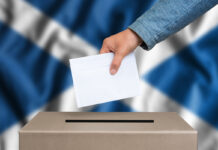Group claims FOI response confirms the Scottish Government has no specific evidence to justify the trading restrictions imposed on hospitality venues

THERE is “no specific evidence” to justify the trading restrictions imposed on the hospitality sector, according to the Scottish Hospitality Group (SHG).
The group submitted a number of Freedom of Information (FOI) requests to the Scottish Government in recent months, requesting “scientific, statistical, or medical evidence for restrictions”. The group initially stated that this “may be, but not limited to, briefing papers, reports, emails, meeting minutes or any other official document”.
An initial response from the government stated that this was impossible, due to there being potentially 3000 documents included in the scope of the request. The SHG then narrowed the FOI to include just emails and meeting minutes. This was also refused, on the grounds that it could include 2000 documents.
Finally, the group narrowed its request again, to just emails and meetings with the national clinical director.
Finally, the Scottish Government responded with a single document containing the minutes of a meeting held with “external parties” and links to two publicly-available papers: COVID-19: Note By the Chief Medical Officer, Chief Nursing Officer and National Clinical Director (available to view here); and a SAGE paper, SARS-COV-2 Transmission Routes and Environments (available here).
The response included a statement from the Scottish Government saying: “Neither the Scottish Government, the chief medical officer’s advisory group nor SAGE have produced evidence papers on a sectoral basis.
“Instead we have used scientific evidence on transmission coupled with the social and economic benefits of particular sectors which ministers have used to make decisions.”
SHG spokesman, Stephen Montgomery, said this amounts to an admission that the government has no evidence of significant transmission in hospitality venues.
He said: “After nearly four months we have finally secured the truth that the government has no specific evidence to justify the restrictions placed on our industry. It’s also deeply disappointing to see no thought given to the knock-on effects of closing hospitality, such as driving people towards house parties, which we know has been a major issue.
“Incredible, the government is asking us to believe that there was no email correspondence with the office of the national clinical director about the evidence base for restrictions on hospitality, considered by them to be one of the main transmission vectors.”
Montgomery added that the group accepts that “lockdown measures were necessary and remain so”, but there has “always been the chance to work a lot smarter by partnering with the industry to have systems in place that protect both public health and people’s jobs”.
“We have repeatedly offered the government different solutions at their request and proactively ourselves,” he said.
“Now that we’re approaching an easing of restrictions, there’s still time for the government to listen to businesses and make sensible changes to the levels system to give us a viable trading chance.
“These levels must not leave us disadvantaged to our colleagues in England. If we don’t get this right now, and allowed to open soon, we will be facing a fourth and fifth winter.”























